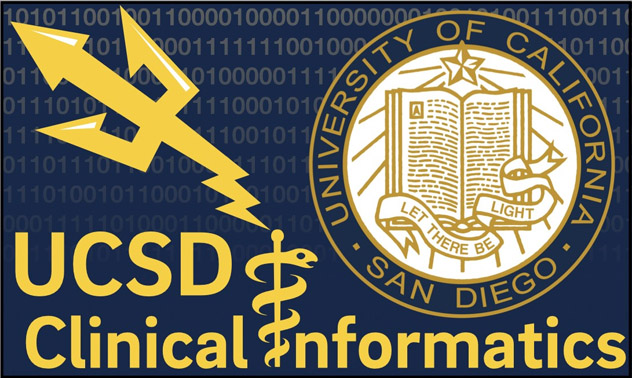Clinical Informatics & Telehealth

The Division of Clinical Informatics and Telehealth is at the forefront of digital healthcare transformation in emergency medicine and the health system broadly. The division is committed to integrating informatics, artificial intelligence, telehealth, and robust cybersecurity strategies to pioneer innovative new models of patient care delivery.
Reimagining Care Through Telehealth and Virtual Care
Telehealth and virtual care are revolutionizing the patient experience under the division's guidance. Dr. Allyson Kreshak leads our ED to Home program to provide robust care at home to patients after discharge from the emergency department, allowing many patients to avoid hospitalization or return visits to the emergency department. The program leverages technologies in the following ways:
- Expanded Access: Patients throughout San Diego County can benefit from the convenience of remote consultations. This is especially helpful for chronic disease management and follow-up care.
- Real-Time Patient Support: Through remote monitoring devices, the division tracks patient conditions in real time, allowing for instant alerts and interventions if health concerns arise.
- Personalized Care Plans: Tailored treatment and guidance are possible using data garnered from virtual care interactions.
Security for a Resilient Healthcare Ecosystem
In the face of mounting cybersecurity concerns within the healthcare sphere, the division champions research to promote enhanced security practices. Dr. Christian Dameff is a national expert in healthcare cybersecurity, and his work is funded by a United States Government Advanced Research Projects Agency for Health (ARPA-H) grant to develop new strategies to protect sensitive health information.
- Advanced Threat Detection Network: Research into leading indicators that can quickly flag suspicious network activity across the healthcare system.
- Continuous Vulnerability Testing: Simulations and workflow analysis to expose cybersecurity weaknesses for preemptive resolution.
- Contingency Systems: To be used in a cyberattack to continue delivering high quality and secure electronic medical record solutions at the point of care.
Artificial intelligence in Workflow Optimization
AI-driven innovations form the foundation of the division's efforts in workflow improvement. Dr. Alan You leads a team collaborating with our electronic medical record vendor, Epic, to iteratively research the enhancement of chart review through large language model summarization and prompt engineering. Dr. Gabriel Wardi’s grant funded research focuses on machine-learning applications in acute care to predict sepsis. The division utilizes sophisticated large language models and machine learning to analyze vast amounts of healthcare data, enhancing efficiency in several key areas:
- Chart Review: Large language models that synthesize concise chart summaries to be used at the point of care.
- Predictive Analytics The division's machine learning models predict risk factors for sepsis, allowing for earlier intervention and medical management of these patients.
- Clinical Decision Support: Rule-based models in the electronic medical record to assist clinicians in sifting through patient data, pinpointing trends, and recommending the most effective diagnostic and treatment plans.
- Medical Documentation (future development): AI systems streamline processes like medical documentation to free up staff to focus on patient care.
Transformative Education for New Healthcare Leaders
To drive long-term change, the division fosters a culture of learning with a novel educational curriculum for fellows, residents, and medical students. Dr. James Killeen serves as fellowship director of the Accreditation Council for Graduate Medical Education (ACGME) fellowship in Clinical Informatics. Dr. Brian Kwan develops novel curricula as Medical Director for Education Informatics. UC San Diego Health’s emergency medicine residency program offers an area of external distinction in clinical informatics, and a novel telehealth curriculum integrated into our departmental conference. Our division empowers the next generation of healthcare innovators:
- Telehealth Best Practices: The curriculum goes beyond just technology, educating on patient relationship-building, virtual examination techniques, telehealth legislative policy, and the ethics of remote care.
- Cybersecurity Foundations: Trainees receive training on network security, medical device vulnerabilities, and threat detection protocols.
- Applied Technology Projects: Throughout the program, trainees participate in real-world projects to apply their knowledge, solving tangible issues and contributing to improvements within the department and the health system.
- Hands-on AI Development: Trainees work directly with AI systems, learning prompt engineering and how to optimize models for diverse clinical applications.
The dedication of our Division of Clinical Informatics and Telehealth paves the way toward a technologically augmented landscape in emergency medicine. AI-driven tools, virtual care advancements, a rigorous focus on cybersecurity innovation, and a dynamic educational program work together to create the foundation for a more efficient, secure, and accessible healthcare future.
Clinical Informatics Program Leadership
- Dr. James Killeen, Fellowship Program Director
- Dr. Brian Clay, Fellowship Associate Program Director
- Dr. Robert El-Kareh, Fellowship Associate Program Director
Division Faculty
- Dr. James Killeen
- Dr. Christian Dameff
- Dr. Allyson Kreshak
- Dr. Alan You
- Dr. Brian Kwan
- Dr. Ammar Mandvi
- Dr. Nathan Yung
- Dr. Jeffrey Tully
- Dr. Gabriel Wardi
- Dr. Scott Ogan
ISMD Faculty
- TBD
Related Links
- Clinical Informatics Fellowship Program
- Current Clinical Informatics Fellows
- Center for Health Innovation
- ISMD Spotlight Interviews - TBD
